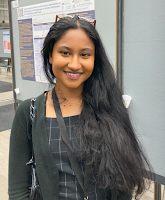Sarah Abdel Fatah, Verrazzano Class of 2024, completed major in SLS (1-6)
 |
| Sarah, Lizebet Rodriguez, Dr. Sarah Berger |
In 2023, I worked in Dr. Berger’s Child Development lab. I worked in her lab during my last two years of high school, left in my first year of college, and later returned in my third year. I worked on was the same study during those times, when the study was in the beginning stages and still in development, and assisted with the completed version of the study. It was bittersweet to end the work in Dr. Berger’s lab, remembering the development and the people I worked with throughout the years.
During my final
year, I learned a lot. I had to watch infants sleep and correctly note the
observations. During this time, I also worked in a group to complete a poster
presentation for the 2023 Undergraduate Research Conference. I discovered how
much goes into data collection and analysis. We spent day and night collecting
data, conducting analysis, and writing our lab poster.
In the
spring semester, I was under the direct supervision of Dr. Aaron DeMasi while
he was finishing his Ph.D. My role was to support and learn. I read many
articles and collected data, along with other jobs. During the summer and fall
semesters, my role changed, and I stepped up to my new position. I learned to
train other lab interns, conduct data analysis, organize lab meetings, and perform
other tasks. Most importantly, I learned how to write up an honors thesis and
the other projects needed in order to complete the thesis, including analysis,
writing, editing, etc.
If I were to
continue, I would love to see the application of the study. I would also like
to see other trends observed. Because of the short time, I could only do so
much; it almost felt like I opened Pandora’s box. I have to close it now, but I
would love to see where it leads and how this information can help future parents
and psychologists. I want to thank those who worked with me and helped me
during this time. Until next time!


